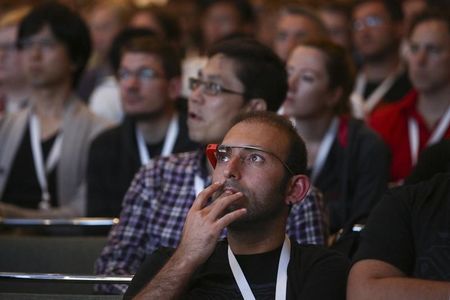By Barbara Liston
ORLANDO Fla. (Reuters) - The first scientific study of driving while texting with Google Glass found that the hands-free eyewear is no safer to use on the road than a smartphone.
"When you look at how fast people react to an unexpected traffic event – how fast they slam on their brakes, we didn't find a statistically significant difference between Google Glass and smartphones," said psychological researcher Ben Sawyer at the University of Central Florida.
Google Glass users are able to send text messages using voice transcription technology as well as head commands.
The Governors Highway Safety Association reports that 44 states ban texting while driving, which studies show doubles the risk of crashes or near-crashes.
This year eight states have considered laws to also ban drivers from using Google Glass and other head-mounted computers or displays, according to LegiScan, a legislative data service.
Sawyer said Google Glass proponents have claimed erroneously that the wearable device delivers information with less distraction because drivers' eyes remain directed toward the road.
"Looking does not necessarily mean you are seeing," said Sawyer, because thought processes remain affected.
Google, the California-based Internet services and products company, did not immediately respond to a request for comment.
About 40 people took part in the study, in which they texted about an arithmetic problem via Google Glass or a smartphone while driving in a simulator. In the process, the drivers were confronted with a car braking suddenly in front of them.
After a near-collision in the simulator, Sawyer said the texters demonstrated different levels of confidence in their ability to safely text and drive. Smartphone users created more space than Google Glass users between their car and the car ahead.
Sawyer said Google Glass offered one slight advantage: users recovered from the near-accident quicker, getting back up to speed on the road faster than smartphone users. Sawyer said that difference suggests future technological advances might be able to lessen distraction problems.
That, he said, is critical for certain drivers whose safety can depend on information obtained on the road, including military and emergency personnel.

"You can tell a teenager to stay off the phone when driving. It's much harder to tell a person in a military context or emergency services context. Driving isn't the most dangerous thing they do," Sawyer said.
(Editing by David Adams and Jim Loney)
_800x533_L_1412662134.jpg)